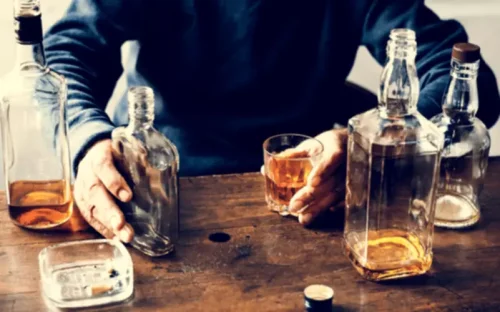Alcohol, Substance Abuse and Depression Mental Health America

Call 999, contact your local mental health crisis team or go straight to A&E if you’re able to safely. Depression is different to anxiety (a feeling of worry or fear about what might happen, inability to concentrate and – for some people – panic attacks). But depression and anxiety sometimes go together – feeling anxious and worrying constantly can make you feel low.

Children of alcoholics (COA’s) do not have an increased risk for major depressive or anxiety disorders
The only certain way to prevent depression after drinking is to avoid alcohol entirely. You can, however, take steps to lower your chances https://ecosoberhouse.com/ of emotional side effects when drinking. Taking some time for productive relaxation can also help ease feelings of depression.
Drink plenty of water
- Existing research indicates that depression can cause alcohol overuse, and alcohol overuse can cause depression.
- This systematic review was performed by searching electronic databases to include eligible trials from 2010 till September 2020 in four databases, including Medline, PsycInfo, Embase, and Ovid.
- Whether you’re experiencing depression or not, it’s essential to evaluate your drinking habits and consider why you drink, when you drink, and how you feel when you drink.
- See the Resources, below, for an NIAAA tool to help you locate these specialists.
- Consequently, this drives the requirement for future studies that examine other anti-depressants with a different mechanism of action in this clinical setting.
- The evaluation consists of 11 yes or no questions that are intended to be used as an informational tool to assess the severity and probability of an AUD.
We reviewed any articles published by one research group investigating similar variables for any possible duplication. Cochrane, a quality assessment tool, was also used to evaluate the included studies [14]. It can get worse over time, especially when combined with regular or heavy alcohol use. By following safe drinking guidelines, you can help reduce your risk for depression as well as other hangover symptoms.
The Association between Alcohol Dependence and Depression before and after Treatment for Alcohol Dependence

When people are depressed, they may experience other health or mental health problems. To relieve the misery of depression, some people turn to drugs or alcohol. People who drink to cope with psychological distress may drink more over time, especially when they wake up feeling anxious or depressed. A 2011 study of adolescents seeking treatment for mental health conditions such as depression found that at the 1-year follow-up, teens who drank alcohol were more likely to attempt suicide or engage in other forms of self-harm. If you drink regularly to manage depression symptoms, it may have be beneficial to work with a therapist who specializes in treating co-occurring depression and alcohol use. Still, many people who receive a diagnosis of substance-induced depression are later re-diagnosed as having depression because symptoms continue after they stop drinking.

The authors identified 11 double-blinded, randomized, placebo-controlled trials of antidepressants in patients with either MDD or dysthymia and co-occurring AUD. In these trials, antidepressants outperformed placebo in the treatment of depression in patients with AUD, with a number needed to treat of 6. The antidepressants nefazodone, desipramine, and imipramine were found to have the most robust effects on decreasing depressive symptoms. On the surface, it may seem like a good idea – to get high, to have fun, to relax, and to escape–but the consequences of consuming large amounts of alcohol; particularly binge drinking and drug abuse soon become apparent in your life. Fortunately, it is also treatable and the key to treatment is to recognize the symptoms and to get help. Take a look at this basic information about the connection between alcohol and/or substance abuse and depression.
International Patients
Increased anger might lead you to pick a fight with a loved one, for example, while extreme sadness or self-loathing could lead to intense depression symptoms. As a result, any troubles you’re facing, from work stress alcohol and depression to relationship issues, may get worse. When you regularly turn to alcohol to manage challenges and negative feelings, you may not take other actions that could help you address those problems effectively.

Drinking to cope can become a pattern
- For many people, feeling sad or unhappy is a prominent symptom of depression.
- On the other hand, Pettinati et al. illustrated that a combination of sertraline, an SSRI, with naltrexone as a treatment for alcohol dependence would result in higher alcohol discontinuation rates and a significant reduction in depression symptoms, with acceptable incidence of side effects [22].
- You can determine whether your patient has AUD and its level of severity using a quick alcohol symptom checklist as described in the Core article on screening and assessment.
Although the cooccurrence of depression and alcohol use disorders has been confirmed by several studies, the relationship between the two disorders has been difficult to describe [9]. Studies have attempted to differentiate between depressed and nondepressed alcohol-dependent persons with particular focus on the participant’s level of alcohol dependence, demographic characteristics, or illness-related variables. It has been shown that depression is more related to the current alcohol drinking episode than lifetime diagnosis of depression [11]. Depression diagnosed in the current episode of alcohol dependence normally remits after 2 weeks of detoxification and abstinence and falls to normal range within 3 weeks [11, 12]. The rapid recovery is in contrast to the slower (17 weeks) recovery from a major depression [13].

